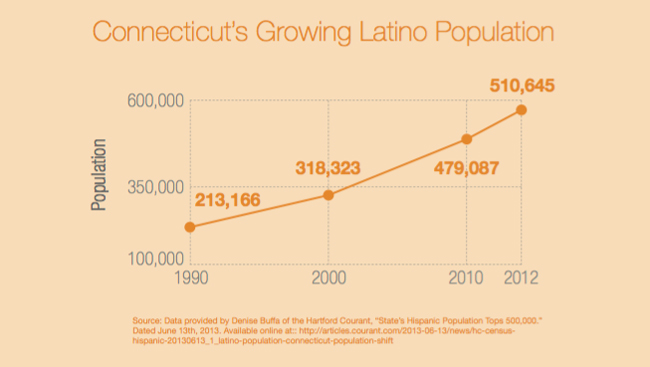
Latino Connecticut puts forth an agenda that calls us to action. For the more than 500,000 Hispanics who call Connecticut home, these are exciting and challenging times. The state is undergoing a dramatic demographic transformation that is making it one of the most diverse places in the Northeast. Connecticut’s Hispanic population grew by more than 50 percent between 2000 and 2012 and the state now ranks 17th in the nation in total Hispanic inhabitants. While most Connecticut Latinos live in Fairfield, Hartford and New Haven counties, other counties such as Middlesex, New London and Litchfield have experienced significant increases in their Hispanic population. In short, everywhere one looks in the Constitution State, the number of Latinos is growing.
The increase in Connecticut’s Hispanic population in the last decade has not only changed the demographic landscape of the state, but also has challenged state leaders to think seriously and creatively about how to address the very real challenges that Latinos in the state face. In many ways, state leaders have already responded with innovative ideas and programs to support Latino families including:
- Enacting a $10.10 minimum wage by 2017 that will benefit Latino residents of the state, many of whom are disproportionately represented in low-wage sectors of the economy
- Creating a state-level DREAM Act that allows undocumented immigrant students who live and attended high school in Connecticut to pay in-state tuition at Connecticut colleges and universities
- Investing nearly 1.5 billion dollars into cities and towns in each of the next two years for Urban Act and STEAP grants funds for economic development, community conservation and quality of life projects for localities
- Becoming the 11th state in the nation to allow undocumented immigrants to apply for a driver’s license, affording undocumented immigrants the opportunity to obtain a Drive Only license through the Department of Motor vehicles, register their cars, and obtain insurance


Connecticut has long been known for quality public schools, world-class colleges and universities and state-of-the-art health care facilities. In recent decades, the growth of the financial sector in places such as Stamford and Greenwich has made the state home to multinational corporations, banks and investment rms. Not surprisingly, the state ranks third in the nation in annual median income. But for too many Latinos, and despite the efforts outlined above, there is another side to Connecticut. It is a place where unemployment is high, wages are low, schools underperform, housing is expensive and quality health care is inaccessible.
The Hispanic Federation’s network of eleven community-based organizations (CBOs) across the state know very well about this other Connecticut. On a daily basis they support families who are struggling to make ends meet, students with significant education gaps, children suffering under the weight of poor health, and immigrants defrauded by employers. It is because of our unique position as a federation of Latino-led organizations that we feel a special obligation to share our knowledge of Connecticut’s Latino communities. This report, Latino Connecticut: A Call to Action, is the product of extensive research, interviews, meetings and policy planning sessions that we conducted with our Connecticut member agencies over the past six months. It reflects the best thinking of our community on Connecticut-specific proposals designed to provide support and relief to the state’s Latino families.

While all of the recommendations in the report are important, practical and achievable, we want to draw your attention to a number of especially important policy proposals, including:
- Supporting Latino Nonprofits: Latino-led nonprofit organizations provide the entire gamut of social services in Connecticut: health care, housing, education and senior services. Despite being the front-line service providers for the state’s most vulnerable Latinos, these organizations receive a negligible share of state government resources. The chronic underfunding of these groups disrupts services to clients and undermines attempts to recruit and retain talented professionals. State leaders can help remedy this issue by ensuring that state allocations are distributed equitably based on population data and need, and by creating a Connecticut Nonprofit Stabilization Fund that supports the core operational infrastructure and technical assistance needs of Latino community based organizations (CBOs).
- Improving Education: Connecticut’s public education system is one of the best in the country. The intellectual capital of the state’s teachers and administrators has produced innovative curricula that make the state’s students national models of achievement and excellence. Latino students in the state deserve the same quality education as their non-Latino peers. While there are a number of policies we believe the state should implement to improve Latino student performance including increased resources, teachers and classrooms dedicated to English Language Learners, year- round schooling for at-risk youth, and additional academic counseling for students and families, we call on the state to invest immediately in early childhood education by creating a universal pre-kindergarten program for all of the state’s four year-olds. This initiative, based in part on the universal pre-kindergarten program implemented in New York City this year, would provide Latino children with a head start on learning and improve their chances of successfully completing and thriving in the elementary, middle and high school environments.
- Increasing Access to Quality Health Care: Like so many of their peers across the country, Latinos in Connecticut face serious health challenges including disproportionately high rates of diabetes, asthma, obesity, HIV/AIDS and cancer. Making these challenges all the more dangerous and dif cult to treat is the fact that many Latino families in the state lack access to quality and affordable health care. According to the Kaiser Family Foundation, as of 2012, more than 20% of Latinos in the state lacked health insurance. Without insurance, Latinos are less likely to get preventive care and to benefit from early diagnosis and treatment. The Affordable Care Act (ACA) has made it easier for states such as Connecticut to leverage federal resources to increase care for Latinos in the state through programs such as Access Health CT. Nevertheless, the state can do more. We believe that Connecticut should create a new Basic Health Program, as permissible under the terms of the ACA, to provide health insurance to adults living between 133% and 200% of the federal poverty level and lawfully present immigrants below the 200% federal poverty level who are ineligible for Medicaid.
- Supporting Immigrant Families: Thirteen percent of Connecticut residents are foreign-born and many of them are Latinos. A growing number of these foreign-born Latinos are undocumented immigrants who are particularly vulnerable to abuse. This is especially true for undocumented immigrant laborers, many of whom face the twin challenges of being targeted by federal authorities and fraudulent practices by predatory notarios, unaccredited notary publics unlawfully practicing immigration law. In order to assist these most vulnerable immigrants, Connecticut should create Community Job Centers throughout the state that not only provide immigrant workers with access to safe work opportunities, but also a full menu of services including adult literacy, job skills training, health services and legal representation.
- Expanding Economic Empowerment and Financial Security: Latinos in Connecticut confront significant economic challenges ranging from low wages to disproportionately high unemployment rates. These factors are to blame for the state’s staggeringly low median personal earnings among Hispanics. If Connecticut expects to continue to be one of the nation’s leaders in per capita median income, it must address the issue of income inequality confronting Latino residents of the state. A concentrated emphasis on helping Latinos achieve higher levels of education and career training must be at the core of a statewide strategy to achieve greater economic parity. Connecticut must also create a comprehensive strategy to establish workforce-development hubs that involve Latino CBOs and can provide Latinos with education, skills training, job-search counseling and work placement.

As Connecticut’s Latino population continues to grow, it is imperative that the state’s leading stakeholders and leaders recognize that the future success of the state depends on the success of Latino communities. From public schools to health care, much of what Connecticut will confront in the future revolves around the needs of its Latino residents. The recommendations contained in this report build upon these initiatives and are based on our best understanding of what the next steps in the development of Connecticut’s Latino communities should be. They reflect our years of experience supporting Latino community-based organizations providing front-line services to the state’s Hispanics.

Finding and implementing comprehensive solutions to the challenges facing Connecticut Latinos won’t be easy, but Connecticut is well-positioned to be a national leader in helping Latinos thrive. By working together with a common purpose, government, philanthropy, nonprofits and community can respond to the call to action laid out in this report and help Connecticut fulfill its great of its residents.
